#atla katara character analysis
Explore tagged Tumblr posts
Text
I actually like zutara as a concept, it's a ship I'll casually read fics about them sometimes.
it's just zutara fans are fucking delusional. Stop treating their Canon partners as abusive when it's the complete opposite. Especially Mai.
Aang isn't a misogynistic monk that forces katara to be his house wife. If he did katara would leave him in a millisecond. He actually cares so much about her. It's actually Canon HE cooks and accommodates his cultural food with kataras.
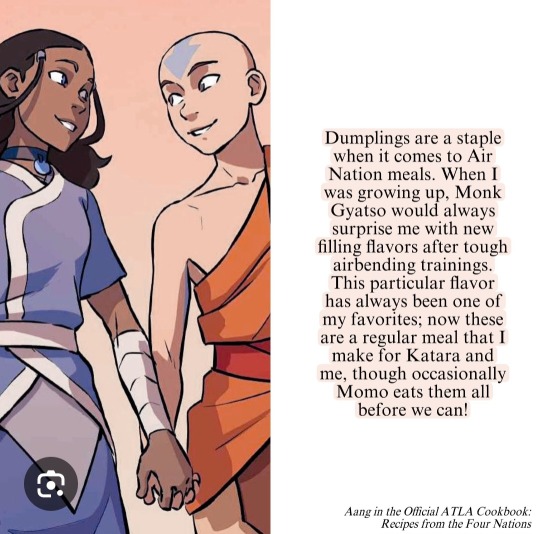
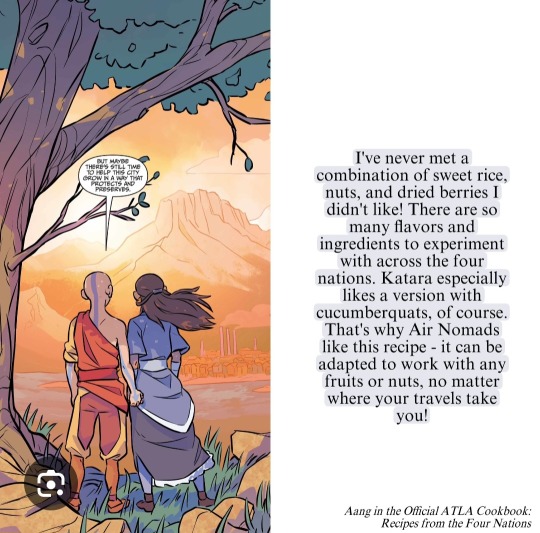
And Mai was literally ready to die for zuko. Even when they just broke up, she was ready to get electrocuted by azula if it wasn't for ty lee chi blocking azula.
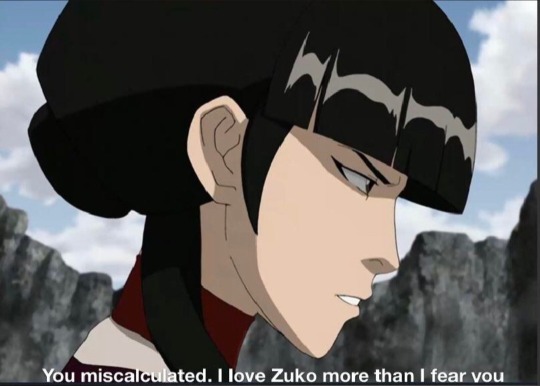
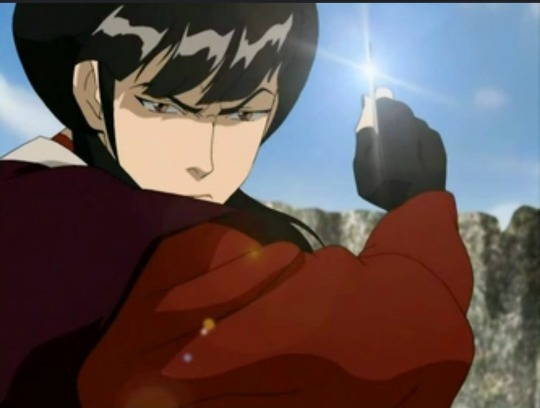
I'm aware it seems like she doesn't care about him the way she's quiet and aloof but I understand where she was coming as someone who somewhat has similar tendencies of being a little awkward when trying to show emotions and it coming off as being uncaring or rude. But at the end of the day she really shows she loves him, so people saying she's abusive is completely inaccurate to her character.
Her bottling up her emotions was taught by her parents as she explains in the beach episode somewhat where she had to worry about her father's reputation all the the time, forcing her to be quiet as a form of behaving.
Personally I think her quiet personality fits with Zukos loud ass, especially giving him a reality check during the beach episode calling him out for being angry all the time and how he needs to keep it in check.
Zutara is a nice ship I agree but you can ship it without mischaracterizing tf out of thier Canon partners.
#prince zuko#atla zuko#fire lord zuko#zuko#katara atla#katara avatar#katara#kataang#katara of the southern water tribe#mai atla#mai avatar#atla maiko#maiko#pro maiko#avatar aang#avatar: the last airbender#avatar#avatar the last airbender#atla#character analysis#shipping discourse
1K notes
·
View notes
Text
It’s really funny how much people misremember certain aspects of ATLA and then proclaim to the internet stuff that either never happened or is extremely distorted with absolute certainty. For example, today I saw a person claiming that whole point of Katara’s character arc was unlearning the parentified behaviours she developed in wake of her mother’s death. That a huge part of Katara’s arc was a confrontation of how that trauma fundamentally shaped her maternal tendencies.
The thing is though…WE the audience, can recognize that the parentification Katara experienced was something that was really straining for her, but the TEXT doesn’t. The audience (or at least certain parts of the audience) can identify that her maternal tendencies were indicative of a responsibility that she took on far too young and subjected her to unnecessary pressure and stress. There are flashes of recognition maybe, but for the most part, the show doesn’t actually confront the negative impact that Katara’s maternal role had on her.
Katara never truly unlearns the maternal behaviours that put so much pressure on her because the text doesn’t see it as a bad thing. Arguably, the text doesn’t see much of a problem with the emotional labour Katara takes on and how that labour goes unreciprocated for the most part (particularly from her canon love interest). We see some reflections, but it’s not enough to support a reading of the text where that element is actually extremely obvious and a prominent point in her character arc.
We’re not the ones “watching the show with our eyes closed”, I think you’re just misremembering the canon progression of Katara’s arc to avoid confronting a real issue in the text.
#Katara#pro katara#avatar the last airbender#atla fandom critical#atla discourse#the gaang#character analysis#atla fandom discourse#zutara#atla critical#anti bryke
500 notes
·
View notes
Text
Favorite friendship dynamic has got to be, “Villain grows to respect hero causing their worldview to change and eventually (probably as a result of hitting rock bottom) realize they were wrong and repent. Hero accepts this, offers their friendship, and helps the villain begin to grow as a person by directing them how to go about earning redemption and how to heal from whatever was making them do villain stuff before.”
This is how I see post season two Romeo and Jesse MCSM, Viggo Grimborn and Hiccup Haddock (if Viggo had lived) in How to Train Your Dragon: Race to the Edge, The Pines Twins and Pacifica from Gravity Falls, Zuko and the Gaang in ATLA, and my own two OCs, wish I knew more.
#mcsm#minecraft story mode#character analysis#mcsm romeo#mcsm jesse#character dynamics#friendship dynamics#httyd#rtte#rtte viggo#hiccup haddock#viggo grimborn#race to the edge#dipper pines#gravity falls dipper#dipper and mabel#dipper x pacifica#dipcifica#gravity falls#mabel pines#gravity falls mabel#ocs#my ocs#original character#atla zuko#zuko#sokka#toph beifong#katara#aang
225 notes
·
View notes
Text
At its core the most important relationship arc in Avatar the last air bender is the one between Zuko and Aang honestly if you can’t see that then I don’t think we watched the same show.
Aang and Zuko are the true Yin and Yang in the show the push and pull. Fire and Air right down to their personalities.
It is both of them that have to go on the journey of learning that fire is more than just destruction can be used for more than just to hurt.
And that right there is the point it doesn’t matter if Aang defeats Ozai and they bring the fire nation to heel. Without a character like Zuko the fire nation would be lost forever to distrust and unrest, balance would never be reached. Because despite everything they have done all the damage they have wreaked the world still needs the fire nation and to work with the fire nation they need to know that fire can do more than hurt. And who best to show them than a prince who’s been burned himself?
The war started with the fire nation attacking the air nomads in a bid for control and it will end with the fire lord embracing an air nomad and taking ownership of his nations actions. You must first close a book before you can start a new one.
Aang needed Zuko just as Zuko needed him because to get peace a true lasting peace you can’t just cut off the head of a snake you have to change its mind. The world already lost the air nomads the balance is already precarious, it cannot afford to lose the fire nation too.
Afterall Air can snuff out a flame and it can also fan them. But when the two elements are balanced one existing in peace with the other it can also make a warm hearth for the home.
#they are literally each others foils even when they are on opposite sides they help each other grow into who they are meant to be#of course there are still dissenters and Ozai supporters#but the country is not in upheaval like it would have been if a whole new leader was put in place by the alliance#or if the alliance had to take up temporary rule#also having zuko already on their side means they could mostly just kick off on rehabilitation#Atla#avatar the last airbender#zuko#aang#avatar aang#Prince zuko#atla analysis#atla meta#atla zuko#atla aang#god the fact that pro Aang is an established tag kills me 😭#fire nation#air nomads#character analysis#I know a lot of people claim tui and la for zutara but honestly katara and zuko are far too alike to be push and pull#but again do as you please I’m just giving my opinion on my blog please do not attack me#zukaang
162 notes
·
View notes
Text
Let's Talk About How Book 3 Ruined Aang
If you've seen any of my prior ATLA posts, you know that I don't hate Aang. In fact, I quite liked him in Books 1 and 2. He was flawed, as all characters should be, but the show didn't shy away from those flaws or justify them. He was called out for burning Katara and rushing his firebending, Sokka and Katara were rightfully upset when he hid Hakoda's letter, he willingly owns up to the fact that his actions helped drive Toph away, and his entire arc after losing Appa and finding hope again in The Serpent's Path was beautifully done.
(Hell, even in The Great Divide Katara says what Aang did was wrong and he agrees. It's played for comedy, but the show still makes the effort to point out that what he did wasn't the right thing to do. You're just meant to understand that he was fed up and acted off of that)
Those flaws and mistakes were addressed and improved upon and helped Aang to grow as a character.
But for some reason, that aspect of Aang's character was completely flipped in Book 3.
The best examples of this are in both TDBS and EIP. Both the show and the fandom are too quick to brush off that Aang kissed Katara twice without her consent, one of which after she explicitly said she was confused about her feelings.
(And yes, she is angry in response and Aang calls himself an idiot. But after this, it isn't really addressed. They go on like nothing happened for the rest of the episode. Aang's lamentation comes from screwing things up with her romantically, not that he violated boundaries)
The show never really addressed why what he did was wrong. Not only because he wasn't given consent, but also because both times he isn't thinking about what Katara wants. In both instances, Aang is only thinking about himself and his feelings. This is something that persists through a lot of the third book. And by Sozin's Comet it ultimately ruins any character development he had built up in the second book.
One thing I feel was completely disregarded was the concept of having to let go of Katara in order to master the Avatar State.
For me, the implication wasn't that he had to give up love or happiness necessarily. He was emotionally attached to and reliant on Katara, to the point where she was needed to stop him from hurting everyone around him and himself. This is obviously detrimental to his functionality as the Avatar. And the point of him "letting her go" wasn't that he had to stop caring about her, it was that his emotional dependency on her was stopping him from being the Avatar he needed to be and that was what needed to be fixed. I don't even think it's about the Avatar State itself, it's about being able to keep your emotions and duty as the Avatar separate.
(If you look at Roku, he loved and had a wife. It wasn't his love for her that messed everything up, it was his attachment to Sozin. He wasn't able to let Sozin go and not only did he lose his life for it, the world suffered for it. It's the unhealthy attachments that seem to be detrimental, not love itself)
And Aang realizes that in the catacombs, which is how he's able to easily enter the Avatar State and seemingly control it. He let Katara go.
So then why does it seem like his attachment to Katara is not only stronger, but worse in mannerism? He liked Katara in Books 1 and 2- obviously- but he was never overly jealous of Jet or Haru. He only makes one harmless comment in Book 2 when Sokka suggests Katara kiss Jet.
But suddenly he's insanely jealous of Zuko (to the point of getting frustrated with Katara over it), off the basis of the actions of actors in a clearly misrepresentative play. Katara showed a lot more interest in Jet and Aang was completely fine with it.
(Speaking of EIP, Aang's reaction to being played by a woman was interesting. He wore a flower crown in The Cave of Two Lovers. He wove Katara a flower necklace. He wore Kyoshi's clothes and makeup and made a funny girl voice. He willingly responded to Twinkle Toes and had no issue being called that. And for some reason he's genuinely upset about being played by a woman? Aang in Books 1 and 2 would have laughed and enjoyed the show like Toph did. His aversion to feminity felt vastly out of character)
I guess my point is, why did that change? Why was Aang letting go of Katara suddenly irrelevant to the Avatar State? It felt like him letting go was supposed to be a major part of his development. Why did that stop?
Myself and many others have talked about The Southern Raiders. The jist of my thought process about it is his assumption that he knew what was best for Katara. And the episode doesn't really call out why he was wrong. Maybe sparing Yon Rha was better for Katara, maybe it wasn't (the only one who's allowed to make that choice is her). Pushing forgiveness? That was wrong. But the episode has Zuko say that Aang was right when the course of action Katara took wasn't what Aang suggested.
Katara's lesson here was that killing him wouldn't bring back her mother or mend the pain she was going through and that Yon Rha wasn't worth the effort. That's what she realizes. Not that she needed to embrace forgiveness. How could she ever forgive that? The episode saying Aang was right wasn't true. Yes she forgives Zuko, but that wasn't what Aang was talking about. He was specifically talking about Yon Rha.
And that was wrong. Aang can choose the path of forgiveness, that's fine. That's his choice. But dismissing Katara's trauma in favor of his morals and upbringing wasn't okay.
I know it sounds like this is just bashing Kataang. But it's not simply because I don't like Kataang, in my opinion it brings down Aang's character too, not just Katara's. But let's steer away from Kataang and Katara for a minute.
The one thing that solidifies Aang's character being ruined in Book 3 for me is the fact that he- at the end of the story- does the same thing he did in the beginning.
He runs away when things get hard.
Aang couldn't make the choice between his duty and his morals. So he ran. Maybe it wasn't intentional, but subconsciously he wanted an out. And this is really disappointing when one of the things he was firm about in Book 2 was not running anymore. His character went backwards here and that's not even getting into the real issue in Sozin's Comet.
There's been contention about the Lion Turtle intervention. For many- including myself- it's very deus ex machina to save Aang from having to make a hard decision. And that in turn doesn't reflect kindly on his character.
Everyone- Sokka, Zuko, Roku, Kyoshi, Kuruk, and Yangchen (who was another Airbender and was raised with the same beliefs he was and would understand which was the whole point of him talking to her)- told him he had to kill Ozai. They all told him it was the only way. And he refused to listen to any of them, rotating through his past lives until he was given the answer he wanted.
And before anyone says that I'm bashing Aang for following his culture, I'm not. Ending the war peacefully, in my opinion, wasn't the problem. In a way, I think it allowed the world to heal properly. However, that doesn't make up for the fact that Aang refused to make a choice and face the consequences of that choice. Instead, he's given an out at the very last second.
Even if he couldn't kill Ozai and someone else had to deliver the final blow, that would have been better than the Lion Turtle showing up and giving him a power no one's ever had before. It would have been a good compromise, he doesn't have to have blood directly on his hands but what needs to be done needs to still get done. It would also show that being the Avatar isn't a burden he has to bear alone. That when things get hard, he can't run away but he can rely on the people closest to him to help him through hard decisions.
All these issues aren't necessarily a problem with Aang. Aang prior to Book 3 didn't have most of these problems. This is a problem with the way he was handled
#aang critical#anti aang#tagging just in case#i don't want aang stans accusing me of cross tagging#it's really not anti aang tho#long post#anti bryke#this is their fault#look how they massacred my boy#anti kataang#katara deserved better#she's not the focus here#but i thought I'd add that there#character analysis#atla critical#anti book 3#which is kind of an exaggeration#because a lot of book 3 is great#it's just most of the latter half
338 notes
·
View notes
Text
If there is some confusion about "which times it's ok for Katara to be a healer" and "which ones are not", there's a simple differentiation - moments when she offers to do individual acts of healing feel like realistic choices, they are individual acts. The incongruency is between her insisting during the series that she doesn't want to be a healer but instead to be a warrior, and then somehow ending up as a healer with no big achievements in life after the war.
I'm not saying it's absolutely impossible to write any character as changing their opinion through life, but the thing is - no writing has actually been done for that for her, plus it's a super sharp contrast to her very solid characterization as a fighter during the entire series. It's understandable why it would not be liked by a large number of people with whom her original character resonated.
#katara#atla analysis#to add to this; characters can change for the worse#characters can have negative development#their lives can degrade in a narrative#not every development is positive development#the question is what kind of development should a character have#and I don't think a negative one for Katara would be a good choice unless a terrible tragedy is being written
135 notes
·
View notes
Text
Why People Disregard What Katara Wants

Because the show did too.
Katara is a character full of power, purpose, and conviction, but when it comes to her own future, she’s strangely silent. Not because she has nothing to say but because the narrative never gives her the space.
The Silence Around Her Future

We know:
Aang wants to rebuild the Air Nomads.
Zuko wants to restore the Fire Nation.
Toph wants to open an earthbending school.
Even Sokka gets framed as a future leader.
But what about Katara?
What does she want after the war?
The show doesn’t say. And because the story doesn’t ask... neither do most fans.
When You're Written as “Support”

Katara’s role is often:
The healer
The mom
The emotional anchor
The one who believes in the hero
So people project their own desires onto her, whether that’s shipping her with Aang (as a reward for him) or Zuko (as a redemption arc).
It’s easier to use her as a mirror than ask:
“What does she want?”
That’s the Real Issue

We keep talking about who Katara should be with.
Rarely do we ask:
What kind of future would Katara choose for herself, without being a reward, a mom, or a narrative vessel?
Until we answer that…
Every ship is speculation.
#fypシ#00s nostalgia#characterstudy#atla#avatar the last airbender#katara#media analysis#female character
30 notes
·
View notes
Note
I find it really interesting how you seem to kind of separate foils as its own thing, and I’m curious about how that works. For example, I know that Katara and Azula are definitely foils - both girls are prodigy benders, associated with blue, lost a mother, etc, but Katara’s compassionate, and Azula’s cruel. I like that contrast, but I never understood that’s contrast’s doing from a standpoint for the narrative as a whole, separate from say, plot or characterization.
So foils are built off two things: the similarities, like you listed, and the differences (Katara being the one to save Aang and Zuko whereas Azula inflicts violence; the compassion and cruelty, as mentioned). We also get into how Katara gives and believes in agency (i.e. her disagreements with Aang in the Avatar State) and disagreeing in a thoughtful manner (much like Aang: "no, Katara, you do have a choice") that contrasts with bloodbending — invasive control, fear and threats, etc — and which is Azula's mainstay: "All your life you've used fear to control people..." "Well what choice do I have?" Azula says that 'fear is the only reliable way' but that doubles as 'control is the only reliable way,' poor girl.
This all ties back into ATLA's thing of "is it your own destiny? Or is it a destiny someone else has tried to force on you?" vs "Aang's following his destiny his way / you have always followed your own path"
Katara's compassion reinforces as well in bringing down the divides between nations. She frees and befriends an Air Nomad; she reaches out to Earth Kingdom kids with understanding and aid (Haru, Jet); Katara symbolically unites the North and South Water Tribes; she and Aang reach out to Zuko&Iroh + the Fire Nation kids (the Headband, the Painted Lady), even though they're Fire Nation and their enemy. In Azula's worldview, there should be no connection or distinction: everything is either Fire (superior in every way) or not-Fire and an obstacle to remove or ignore.
A lot of the 1st and 3rd paragraphs though is implicit narrative subtext. ATLA never has a character say "balance can only be restored through all the Nations working together" even though the show Hinges on the very concept and reinforces it over and over again, with the White Lotus just being an older all-male version of the Gaang (at least one bender of each type sans air but Iroh honestly takes Aang's role; a sword master, etc).
So the contrast between the two girls helps create their characterization; their characterization contributes to their foil relationship; and that foils dynamic helps build ATLA's narrative and thematic messaging. It is plausible, after all, to have two characters who have parallels but don't quite achieve foil status (Mai and Yue, or Mai and Toph for example), and a show can have a strong narrative / characterization without really having any foils (Jurassic World: Camp Cretaceous is a good example).
Honestly my favourite foil dynamic of all time has to be Viren and Callum from The Dragon Prince because they are an immaculate villain-antihero-hero foils dynamic built throughout 7 seasons. The Dragon Prince uses foils so well it's kind of incredible, and I do think uses them in a more complex way than ATLA — Viren and Callum have narrative, thematic, and heavy characterization similarities, while also still maintaining contrasts — so if you want to learn more about them and how to do them well, I'd rec the show just for that (and its worldbuilding, and ethical dilemmas, and queer rep).
For a quick overview of what I mean while avoiding not too many spoilers:
Callum is Dragon Prince's core protagonist; Viren is its main antagonist (S1-S3) and then he has an atonement arc (S4-S6). They are both mages: Callum becomes a primal mage (neutral to positive magic system), and Viren is the High Mage of Katolis and practices primarily dark magic (a malevolent magic system). They both have kings who are also their brothers, and mysterious elves who directly encourage their magical paths and journeys—Callum's has his best interests in heart, Viren's very much does not.
While the main difference between them is that Viren primarily seeks magic and power for a sense of self-importance — eventually forsaking and damaging his family unit — Callum seeks magic and power to protect his loved ones; he'd never forsake them. What the show then displays, then, is that like Viren once upon a time, Callum's road to hell is paved with good intentions (Viren did and does love his family) even if he never falls prey to the same political ambitions, there's still heavy Consequences for the magical choices he's making. Viren, meanwhile, moves towards where Callum stands, loving his family again and learning to make selfless choices even if he's never forgiven. Callum even becomes High Mage, just like Viren, and uses Viren's staff / takes it as his.
They both say shit like:
VIREN: If it's love, then nothing else matters. Do what you must. (6x06) VERSION OF CALLUM: It's not about you, is it? If you love her, you'll be the you that can save her. You'll do what you must.

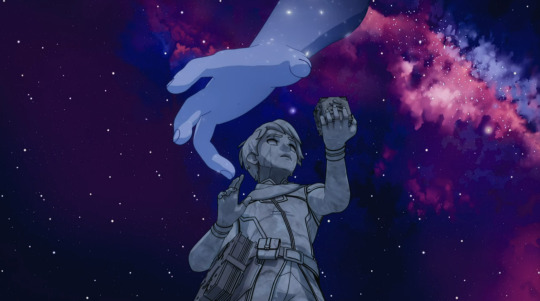


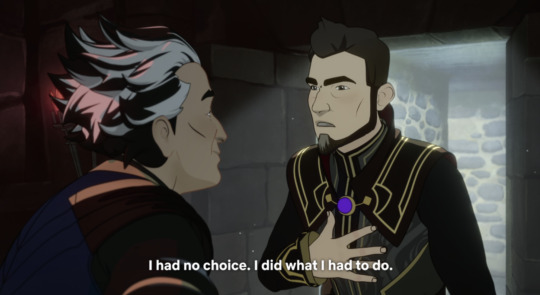






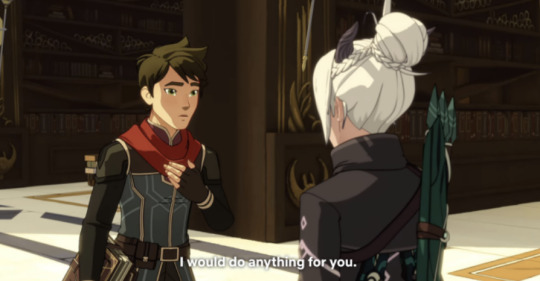

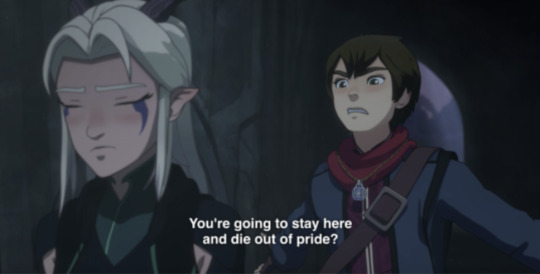


And like, everyone in TDP kind of has foil bonds like this. Viren and Callum's is definitely the most developed central foil relationship, but Claudia and Rayla — whose foil dynamic reminds me of a messier Azula and Katara, respectively, are Also like this to an absurd degree. Whereas in ATLA Katara doesn't really have any personality similarities to Azula except perhaps like, determination and maybe a temper, TDP is out here letting the antagonists make good choices and the protagonists make crappy ones because they are so painfully similar it hurts.

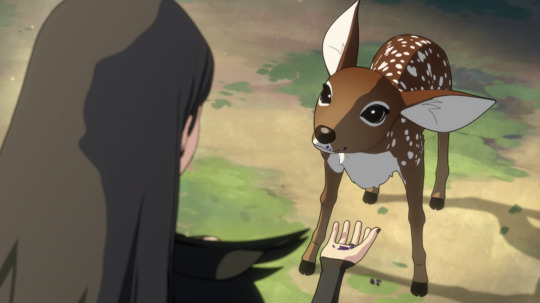
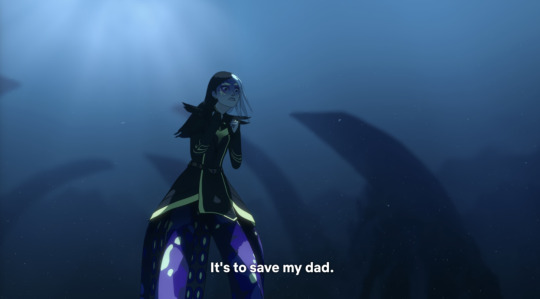



#thanks for asking#azula#katara#atla#the dragon prince#writing advice#analysis#foils#characters#parallels#requests
42 notes
·
View notes
Text
Why Zuko and Ash Lynx Struggle with Their Own Souls: A Jungian Analysis


While watching Banana Fish a few months ago, I couldn’t help but feel capricious waves of deja vu because of Ash Lynx and Zuko's eerie similarities. They’re both teenage boys who possess kind, selfless, and genuinely good souls but become distorted because of the systems that are fringed on violence and corruption leading to them having convoluted psyches and self-esteem. How these two pieces of media demonstrate the horrors of spending the most formative years of your life growing up in worlds like these and the importance of having strong parental figures and support systems is astounding and genius. Consequently, I wanted to highlight their weakened anima and how it influences how they interact with the world due to the absence and abandonment of their mothers. Characters like Katara and Eiji are vital in both of the stories as they symbolize feminine archetypes by leading these men to self-acceptance and emotional harmony after battling arduous life paths through love. I hope to bring a nuanced perspective to them connecting their traumas to the Carl Jungian psychology approach.
What is the Anima?
The Anima is the feminine personality in men’s unconscious and typically weakens because of poor maternal figures. According to Carl Jung’s theory, this manifests in emotional irritability, emotional repression, vacillation, and childish sexual desires. His theory emphasizes traditional roles making it feel narrow, but with modern psychology, we’re now aware that our environments catalyze how trauma is processed in a nuanced manner. Zuko and Ash are devoid of emotional irritability and indecisiveness by using emotional repression as a form of detachment because of their highly treacherous and hyper-masculine environments. They both exude high levels of intelligence regarding this world of danger making them acutely aware of the risks that come from showing vulnerabilities which also manifests in hypervigilance of their surroundings. The unconscious grief they carry because of the loss of their mothers at such young ages distorted their perception of nurturing themselves and their emotions.
I’m using the images below to demonstrate the violence they endure and the two events are so uncanny as GROWN MEN (Arthur and General Zhao) act purely out of hostility towards TEENAGE BOYS after they lose against them in duals retaliating by attacking the boys when they’re off guard with the intentions of severely injuring them or worse.


Eiji and Katara’s Presence & Feminine Archetypes in the Unconscious
The anima also manifests in an intense longing for connection but subconscious limitations of accepting it. Katara and Eiji serve as integral relationships in their character development as they perfectly embody characteristics within feminine archetypes prevalent in Carl Jung’s theory of them notably in the nuclei of a man's unconscious. Some prominent figures representing this theory are The Virgin Mary (she symbolizes the allure and fantasy of men's desire for purity), The Mona Lisa (she symbolizes the desire men have to attain this idyllic woman that exudes mystery), and The Amazonian Woman (she represents the longing men have for adventure and an
innate need to experience different cultures through women on other lands, figuratively or literally). Nonetheless, the most fundamental archetype that’s transfigured the generational standards of family and relationship dynamics is the “Healing Woman” archetype. This archetype aligns with Eiji and Katara as they fully embody the qualities of the archetype and its representations of nurturing, emotional healing, and unconditional support. In addition, Eiji’s relationship with Ash is endearing as he provides Ash with genuine love, safety, and care without any ulterior motives. A crucial scene demonstrating this is when Ash inadvertently discloses the first occurrences of the sexual abuse he’s endured by his baseball coach when he was only seven years old expressing how powerless he felt and the ruinous effects it had on his soul. It shows the impact Eiji’s presence has on Ash as he’s open to vulnerability because of the warmth and open-mindedness Eiji exudes which inspires growth. Similarly, Katara offers Zuko forgiveness and redemption gradually making him earn it which challenges him on an emotional level and evolves him. The iconic cave scene between Zuko and Katara serves as a parallel to the non-transactional nature of Eiji’s and Ash’s relationship. Katara immediately offers to heal Zuko’s scar with the small traces of the coveted healing moon water she attained after they both confide in the devasting events the fire nation has enacted on them which has gravely affected their senses of being which offers a sense of hope that Zuko will redeem himself in that exact moment. Moreover, this scene is so deeply reminiscent of their relationship as they both evoke hope and resilience in carving their destiny and defying themselves against a world that thrives off selfishness and malice.
The images below also highlight the vulnerability of both of the scenes as Ash and Zuko are open to receiving touch at intimate parts of the body, typically reserved for close platonic or romantic relationships. The physical closeness of the two is endearing as well. I’d also say how the lighting in both of these scenes provides a striking contrast against their skin tones and surrounding color palettes, emitting hues of yellow, orange, and green. This serves as a visual metaphor of unity despite differences in self and upbringing. I find the body language in these scenes heartfelt as Zuko and Ash are seen both closing their eyes, as their faces and most infamously, their eyes have been ingrained parts of their character as these features have been notoriously commented on. Here, their closed eyes symbolize a retreat from hypervigilance as they allow themselves to be vulnerable, embracing the warmth and affection they feel in those moments, instead of anticipating threats by resisting the sense that’s infiltrated their sense of survival, sight. What if Ash never SAW the Banana Fish capsule? What if Zuko never SAW the injustices his father was enacting? Their sight catapulted these stories too in a way.


The “Self” and the Unconscious
Carl Jung’s concept of the Self represents the wholeness of an individual as their subconscious, unconscious, and consciousness in alignment, which manifests in emotional harmony and the tranquility of the soul. Achieving this state requires interpersonal events that catapult into transcendence and the understanding and actualization of the Anima and Animus. Zuko and Ash’s tenuous states of their Anima are prevalent in how they struggle to navigate empathy, emotional security, and acceptance because of the absence of their mothers who represent these traits in society. In the eminent “Zuko Alone” episode, Zuko is seen reminiscing on his childhood, and the formidable presence of his mother is shown through the few memories he has of her that he cherishes deeply. Moreover, the infamous scene of Zuko throwing rocks at the ducks in the pond to mimic Azula’s apathy immediately raises concern in Ursa as she’s quick to teach him the severity and weight of what he did which instilled the importance of empathy. The significance of this shows how Zuko’s first connections to morality and compassion come from maternal sources in contrast to his father's unforgiving ideals. Hence, why we see him have an ambivalent sense of morality as he tries to fill the unconscious void of his mother by accustoming himself to his father's enterprises and philosophies built off violence. Likewise, a pivotal scene in Banana Fish is when Ash confides in Eiji about the abandonment of his mother and the etymology of his name, the name his mother gave him expressing it with a sense of melancholy and twinges of sorrow. This illustrates the unconscious yearning he has for maternal relationships and emotional connections but this rejection has disfigured his self-worth at recognizing whether he deserves them in the first place on a subconscious level. In previous scenes, we see Ash appear aloof and disdainful towards his mother because of her abandonment leaving him in a devastating and desolate state bearing her parental responsibilities onto his older brother, Griffin as their father was negligent. He even outright calls her a “whore” at one point. Consequently, we see this manifest in both Zuko and Ash dismissing their innate “feminine” emotional qualities which causes them to struggle with vulnerability and intimacy in relationships as they subconsciously equate them to weakness and liabilities. Additionally, this shows up momentarily within Zuko as struggles with communicating his emotions in relationships and Ash feigns indifference in relationships. Above all, this grief of abandonment transversed into them possessing avoidant attachment styles regarding relationships.
The images below are very telling regarding their facial expressions and contrast each other with Zuko’s face radiating a childlike gaiety as he’s tinged by ignorance instilled by his upbringing. Ash’s body language is fascinating because it’s paradoxical, open but tense and insecure as he slightly slouches showing his sullen facial expression. The lighting in these scenes is warm and dynamic presenting themselves in an almost dream-like haze. It symbolizes the rare instances Zuko and Ash receive love and how they grasp it in profound and visceral ways.


Conclusion; Transcendence, Wholeness, and Anima
Both Zuko and Ash reconcile and harness the feminine side of their unconscious methodically to achieve psychological wholeness. Zuko attains this through his renowned redemption arc by embracing his softer qualities such as empathy and prioritizing love and peace. In contrast, Ash tragically only experiences glimpses of self-actualization. Eiji and Katara symbolize the importance of feminine traits as a collective as they serve heuristic roles not only in society but especially in men. Society tends to demonize and alienate men from expressing crucial human emotions by ignoring the need for both the feminine and the masculine to coexist. Both of these shows highlight the ruinous effects of toxic masculinity on the psyches of men. I hope this post provides an entertaining elucidation of Carl Jung’s theories and their integration into pieces of media that are very dear to me and to the majority of others :)!
#banana fish#ash lynx#eiji okumura#atla#zuko#character analysis#the unconscious#katara#jungian psychology#psychology
23 notes
·
View notes
Text
Just chugged a redbull at midnight. Anyone wanna talk about how Katara is literally the best written woman character ever?
She’s full of rage. The biggest badass on the block. But she isn’t a generic Black Widow type badass woman who has only that one personality trait. She’s still allowed to be feminine, and motherly, and emotional, and these things are treated as strengths rather than flaws. She loses to Master Pakku when she challenges him, but any of the characters would have, and it doesn’t take away from her point.
I fucking love Katara.
#atla#katara#character analysis#avatar aang#sokka#master pakku#katara is so cool I wish women were real/j#netflix atla ruined my girl they killed her
23 notes
·
View notes
Text
I think people hate on Jet WAY to fucking much. Like yall act like he didn't witness his parents get brutally burned alive as well as his whole village go up in fucking flames. He makes like two mistakes and yall go "yeah THATS public enemy #1"
Don't get me wrong obviously I don't condone him flooding an earth kingdom village cus it was invaded by the fire nation that I can agree with was too much 😭 but omg don't you think if your whole life was burned down you'd be a little fucked up in the head??? And be basically blinded by your own hatred for those who murdered your family??? Like I said what he did was absolutely wrong but to call him like evil reincarnated is a little far, bro was just a misguided kid who hated his oppressors more then loving the ones he swore to protect, but in the end he did realize he needed to focus to protect the ones he loved more but he ended up dying for it. And that's why no one really cares about his character growth and it honestly irks me 😭😭
Edit: not to mention when he found out zuko & iroh were firebenders, he didn't know thier intentions. Obviously we did and knew they weren't planning anything but he didn't. In his mind he probably thought they were fire nation spies trying to invade ba sing se and that's why he attacked them.
#jet atla#jet avatar#atla#avatar: the last airbender#avatar#avatar the last airbender#character analysis#maybe???#idk#atla zuko#aang#atla aang#toph beifong#toph atla#toph avatar#katara#katara atla#katara avatar#sokka#sokka avatar the last airbender#sokka atla#freedom fighters
61 notes
·
View notes
Note
what’s your take on zutara being “you’re the wind, i’m in the water”. i’ve heard k@t@@ngs saying it’s clearly about their ship bc their elements are air and water but isn’t that a very surface level of understanding of the lyrics?
anon, i adore you for this ask because i love chemtrails over the country club (and lana's music in general).
i'm not surprised that people would try to apply this song to katara and aang because yes, at a surface level it's relevant to them for obvious reasons (water vs. wind), but i agree that the lyrics have far more depth than this.
first, we have to look at the context of the lyrics within the song. "you're in the wind, i'm in the water" presents a romanticized view of the separation of two lovers, just as the two elements brush past each other but never become one. this theme of separation is seen throughout the rest of the song as lana contrasts the privileged bubble of suburbia with the harsh reality of society, the darkness lurking behind a beautiful front.
likewise, zuko and katara have similar character arcs that revolve around an awakening to the harsh truths of society. zuko learns that the beauty and the power of the fire nation is just a facade, hiding the extreme cruelty of its colonialism and imperalism that has hurt all people (which goes hand-in-hand with zuko unlearning the abuse from his father, the personification of the fire nation itself). katara's arc involves a similar type of awakening, as she unlearns some of the dichotomous thinking she's held around the fire nation. her experiences with jet, hama, the sexism of the northern water tribe, the fire nation village in the painted lady, and even zuko show her the complexities of the war and teach her that people aren't always as simple as "good" or "evil." essentially, both zuko and katara undergo parallel character arcs that fundamentally change their worldview, reflective of the theme of chemtrails over the country club.
additionally, the "wind" and "water" that symbolize the separation of the two lovers in the song is also reminiscent of zuko and katara's journey - the two characters that have been pitted against each other from the beginning of the show, their opposing goals of protecting the avatar vs. capturing the avatar, daughter of the chieftain of the southern water tribe vs. prince of the fire nation, and the two characters that end every season finale in an climactic fight scene (first on opposing sides, then on the same side). and if you want an even more bittersweet perspective, there's also the fact that they are doomed by the narrative, two lovers who never end up together in this lifetime, fated to be separated.
if we want to look further into the song, i've also seen the lyric "nobody's son, nobody's daughter" being superficially applied to aang and katara as they have both experienced loss, but again, in the context of the actual show, it's katara and zuko who are repeatedly paralleled with this connection of losing their mothers and being separated from their fathers. katara discusses her grief over losing kya with haru, jet, and aang, but it's only her and zuko's connection over this that carries actual narrative weight in the story. and katara is the only person that zuko discusses the loss of his mother with. so it only makes sense that all of these narrative parallels culminate in the southern raiders, an episode vital to katara's character arc in which zuko is a crucial supporting character. you could also argue this ties in with the overall theme of separation in the song - being separated from your parentage and having to forge your own path.
finally, as a fun little addition, one of the other lyrics in the song is "my moon's in leo, my cancer is sun." and hmm, who are the two characters we typically associate with the moon and sun? (hint: "you rise with the moon, i rise with the sun"). but wait - it goes even deeper than that. i am most definitely not an expert on zodiac signs, but according to some basic googling, leo (a fire element) is typically ruled by the sun, while cancer (a water element) is typically ruled by the moon. by switching up what elements we typically associate with the signs, lana is reflecting on the duality and the unpredictability of herself like how she reflects on the duality of society earlier in the song. and similarly, zuko and katara undergo dual character arcs bound by elemental symbolism. despite being a waterbender, katara also personifies the element of fire - the element of passion, power, and will - as she stands up against injustice and refuses to back down from a fight. and despite being a firebender, zuko's arc also personifies the element of water - the element of change and adaptability - as zuko's perception of himself, his father, and the fire nation changes over time. they are both water and fire, both moon and sun, both yin and yang.
#zutara#zuko x katara#zutara analysis#atla#my post#my meta#anti kataang#kataang critical#my asks#i'm sorry this took so long to answer anon!#writing this post almost convinced me lana wrote this song for zutara#i think it just goes to show how well written zuko and katara's parallel character arcs were#i've seen many a tiktok bashing zutara shippers for posting zuko and katara to these lyrics and arguing that k//ataang fits better#and ugh... it's just such a superficial analysis to compare just based on the elements of wind and water
69 notes
·
View notes
Text
6 hours and a fitful sleep later and I'm still obsessed with @bonesbuckleup's watertribe siblings analysis and I already screamed about it in the zukka server but that's not enough, it's not ENOUGH YOU HEAR ME I have to shout it at the sky!!!!!
Their relationship is so codependent, two kids, all but orphaned, left to raise each other, trapped in the same roles that had helped them survive through their culture and tribe and family being dismantled by a century of violence, but they can't escape it now when it no longer serves them.
The war is ending but the cycles keep repeating. Brother and sister, boy and girl, warrior and wizard, the rules that made sense and provided a structure to cling to while everything else fell apart are now cutting into them.
Katara wants more freedom from the roles assigned to "woman" but not too much freedom. She gets angry when Toph acts boyish and immature, she shuts Sokka down when he pulls back the veil and reveals the still festering, unprocessed hurt of their mother's death haunts him, too. She wants to break with tradition unless it's a tradition that makes her feel good/important/special.
Sokka defines his existence as a man to be a warrior, but he refuses to define a warrior as anything other than a physical, violent sacrifice. A tactician is invaluble in both war and peace, a person who can organize and mobilize the chaos around them worth so much more than a single glorious ("glorious") moment on the battlefield, and even Piandao sings his highest praise for Sokka's MIND, his intelligence and creativity. But it isn't enough. Sokka still believes that his meaning and purpose in life is to die at the end of a sword.
"She was my mother too" Sokka's grief is always so quiet and private, "she's my mother too" that was, from him, practically an anguished scream. "She was my mother, too," he says and for the briefest moment he chooses to pull aside the armor around his heart and let Katara see that still weeping, festering wound through it, and she. Can't. Handle it.
It's almost like Sokka has enabled the worst aspects of his sister's inflexiblibity by sheltering her from the consequences. Katara relies so heavily on Sokka having his shit together, on Sokka being the unfeeling, calculating one ("oh Sokka, you DO have a heart!") that she can't accept that he maybe actually isn't blissfully free of deeper emotion, because the deeper implications of that would shake the foundations of her self image of the caring, open, empathetic sibling. So she shuts it down. Shuts his appeal out. He can't feel the same as her, because if he did it would redefine all of their assumptions and history and relationships.
They fall instantly back into thier same patterns. Of course Katara apologized to Aang and not Sokka. The siblings are unable to address it, move on from it, because to do so first they would have to deconstruct so much of their shared trauma. Mom died, Dad left, both of them fell back into the rigid roles set out for them because there was nothing else left for them. They built themselves back up out of ruin together, mended but not set. Now it's all crooked and ugly, but fixing it is going to require a painful rebreaking that neither of them are prepared for, so they just keep on dragging this mangled part of themselves around, hobbling in circles, carving the same patterns deeper.
#sokka#katara#atla#meta#character analysis#watertribe siblings#lizard is starting to ramble#they make me unwell
28 notes
·
View notes
Text
Disclaimer; these are just my opinions. I'm not looking to start a fight.
I'm getting concerned about Katara's character in Netflix's show.
In almost every trailer, advertisement, interview-at least the ones I've seen-they've been really trying to drive home the point that she's a warrior. Which she is; there's no disputing that. By the second half of the first season she's a force to be reckoned with.
But that's not what I think of when I think about her.
It's not her defining character trait. Her main goal isn't to become a warrior; at least, she doesn't want to be a warrior just because. It happens out of necessity, because she has talents and abilities that are huge assets when fighting.
But at her core, she's a caretaker. She's a girl who sacrificed her dreams and own desires for people who needed her at the age of eleven.
Having her openly pursue and argue with Sokka over the whole 'warrior' business almost seems to discount that. It adds a touch of immaturity and naivety to her character that just feels shallow. Katara has always understood sacrifice; what it means to give up your own wants for another's-she does this all the time.
It's one of the things I find most admirable about her character.
From episode one it's established that she's the person that makes sure everyone has everything together; she's not, primarily, a fighter. She can fight-and she does-but she's more than that. Katara holds the gaang together, both physically-cooking, repairing clothes, making sure everyone's healthy-and emotionally-calming Aang out of the Avatar State, encouraging Sokka, attempting, albeit unsuccessfully and overbearingly, to curb Toph's reckless antics. Even in season 3, when Zuko shows up, her mistrust and dislike of him is because she's trying to protect everyone else.
When I think of Katara, the first word I think of is 'motherly'. I don't want Netflix to box her into the Marvel-girlboss-power stereotype, scrubbing her of any depth and femininity in the name of making her a warrior. Being motherly doesn't make her weak; being the one who cooks, cleans, and makes sure people are, i don't know, sleeping, doesn't make her weak.
It makes her incredibly strong.
She's a warrior, but that's not her first characteristic. She's one of the few people in the series who truly understands how consequential their actions are. She understands that sacrifices need to be made; she's seen them made first hand. Katara's motherliness is an outward sign of the way that she sacrifices for others; she gives them her time, her energy, and her love. That's different than how her brother sacrifices, how Aang sacrifices, how everyone else in the series sacrifices; but that's okay.
I don't want Katara to be just a warrior. I don't want her arc to be purely about 'fighting sexism' or whatever. She's deeper than that. I'm sick of these copy-and-past boss girls hollywood keeps churning out. A;tla is full of so many complex female characters, they don't need to be changed to be 'strong' or something along those lines.
The greatest thing about Katara is that she was a strong female character before she had the ability to throw grown men across the battlefield; and her arc in the first season was so much more about her growing into her abilities than all oh 'woe is me, a female in a patriarchal society!' and I love that. She didn't just complain; she changed the status quo and proved that the Northerners were just plain wrong.
Her magic abilities aren't what make her strong; her ability to fight isn't what makes her strong; her proving that women can and will fight if necessary isn't what makes her strong;
Her passion, hope, love, motherliness, compassion, desire to impact the world in a positive way, and arc about learning to let go and forgive are the things that make her strong.
C'mon Netflix, don't scrub that for some Marvel copy-and-past.
#katara#avatar the last airbender#character analysis#christian perspective#netflix#netflix series#netflix atla#avatar aang#aang x katara#sokka
41 notes
·
View notes
Text
There's a post going around Tumblr about the color palette of your name (I saw @prodogg do it) and I tried it but my name has a very boring color palette so I did Atla characters instead.
Aang:
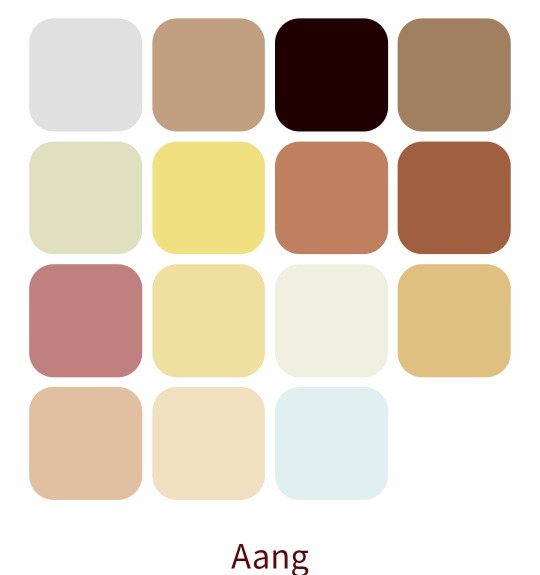
Okay! All of them are very bright colors that represent Aang's bright attitude and there's a dark shade at the top row which brings to mind the flaws of his character. Personally, I feel like that dark brown represents the guilt Aang feels for leaving. We also have some yellow and soft red, which are the colours of his outfit. There's some light grey that reminds me of his eyes and pretty light blue and beige, breezy light his element. We have some blue, some yellow, some green and some red. True Avatar core right there.
Katara:
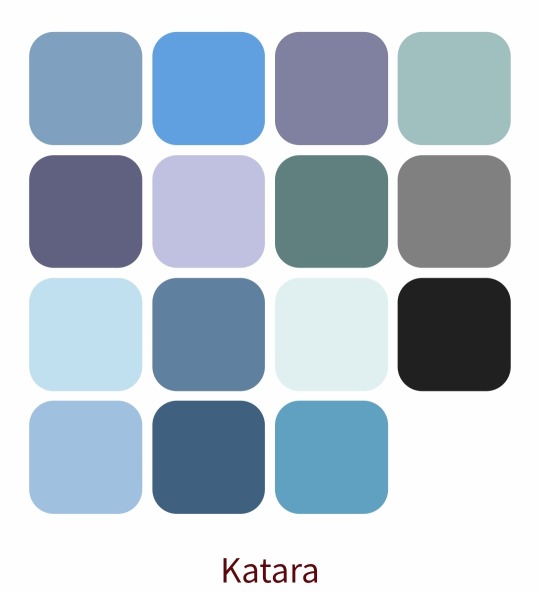
Ohhh~ So many pretty blues! Blue eyes, blue clothes, blue nation, blue element and so on. Once again, I feel like the dark color in the third row represents the more bitter parts of Katara personality. Her small moments of jealousy, spite and harness. I also like how all the blues are different shades, some coming close to grey, others close to green and some being pure blue. The variety of shades really shows what I well rounded character she is.
Sokka:
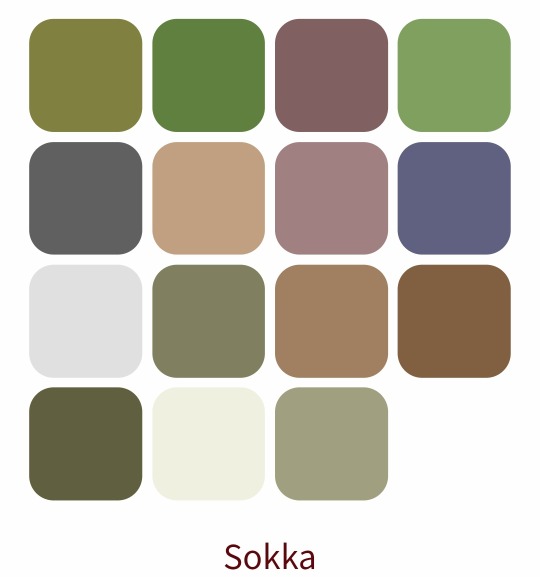
Oh my... That's unexpected... There's only one shade of blue! But I can see some pretty browns and greys in there that are in his colour palette. I wonder why there are so many greens... Probably because he's one of the only characters that are grounded to earth 😂 maybe even a bit too much, seeing how he's always suspicious and doubtful. There are also some snow-like colours in here, which is fitting, seeing as he's from the Water Tribe 😎.
Suki:
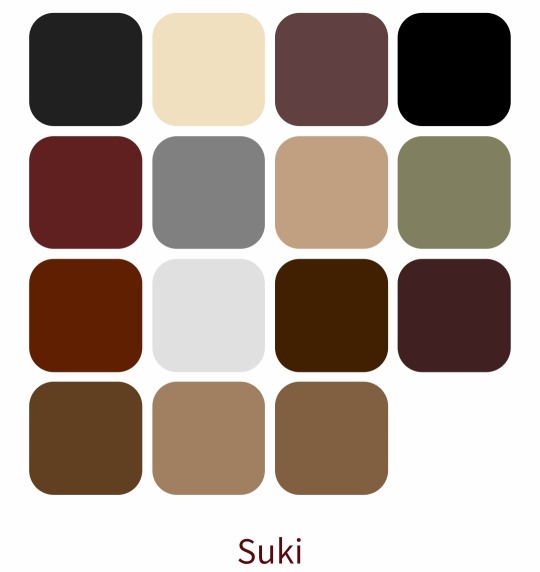
That's a very interesting palette... The brown colours remind me of the Earth Kingdom, but there's a snowy white in there, probably because of how close Kyoshi Island is to the Southern Water Tribe. There's also a bit of green in there, even if it's greyish, and I couldn't help but notice those dark shades of red... Is it because she relocated in the Fire Nation after the war, and is currently working as Zuko's bodyguard? I also see a few really dark shades in those top corners, although I'm not surprised. Suki is a warrior through and through, and sometimes warriors have to do some ugly things to protect their homes.
Toph:
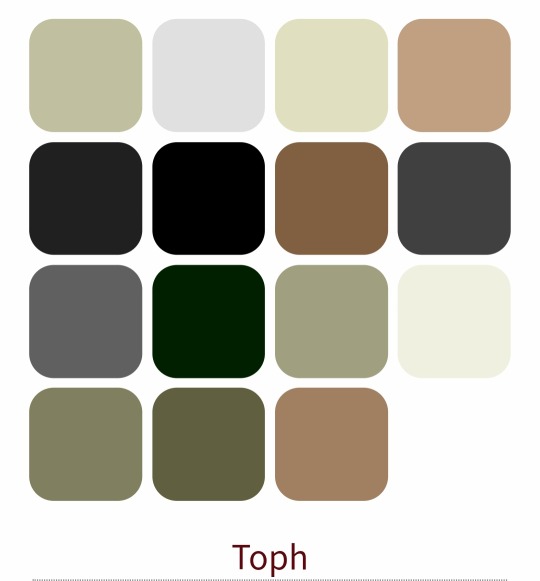
No surprises here! I like how Toph has more dark shades than other characters, since she's more in touch with her "dark side" after participating in secret wrestling matches and pulling all those scams. Many shades of green and brown, like her element and her country. But there's also some very light greens in there, so light that they could pass as white or grey, which is unlike the usual Earth Kingdom greens. I wonder if it's because she uses her bending in a much different way that all the other earthbenders, which makes her special. Or it could be because that's the color of her eyes.
Zuko:
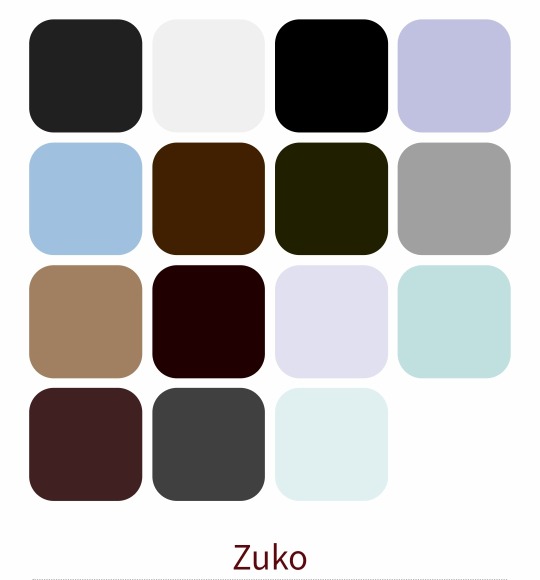
That palette is an interesting one for sure. There are so many dark colours in here! And as we all know, the Prince of the Fire Nation didn't have a very happy life, or a very bright attitude. There's a dark brown-red in here and a dark blackish green, along with some blues and greys and a brownish gold. I wonder if it's because of his travels to all the four nations during his search for the Avatar. And I'm loving the references to the Blue Spirit with all those blues in there. Zuko's second, secret persona is a big deal for his character, since all the times we've seen him wear that mask, we've also gotten hints for his future redemption and friendships.
Azula:
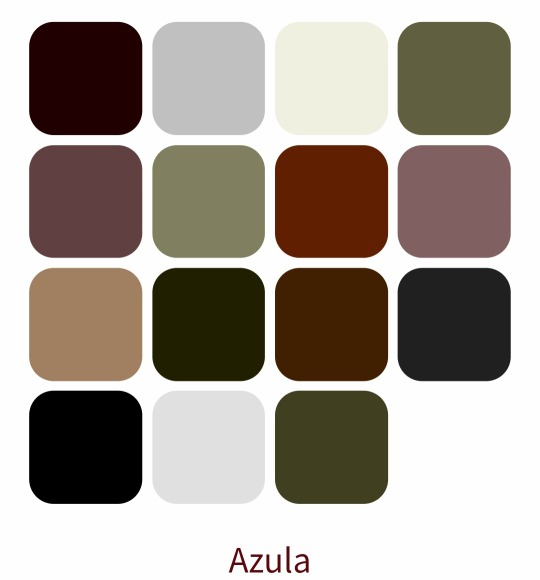
Ah, there we go. My favorite girl! Right of the top we have some dark shades, fitting for s true vigilante. There's some brown-ish gold abd black, which brings her hair and eyes to mind. A pretty shade of red, for a true Fire Nation Princess. The lack of blue surprises me, seeing as her fire and her lighting are both blue... I guess the website must believe that she is much more than her bending. And there's quite a lot of green I see... Probably because her peak as a strategist and warrior was conquering Ba Sing Se and bringing the Earth Kingdom to its knees, all while wearing the iconic green Kyoshi Warrior uniform and the even more iconic green Earth Queen outfit.
51 notes
·
View notes
Text
Critique Isn’t Hate: How to Spot Manipulative Arguments in Fandom (and Shut Them Down)

There’s a growing pattern in fandom discourse where people confuse critique with hate, and emotional projection with canon. And when they can’t win the argument? They start throwing around buzzwords like “misogyny,” “anti-feminism,” or accuse you of “not understanding character arcs” not because they care about those things, but because they ran out of points.
Let’s break down the playbook and why you shouldn’t fall for it.

“You’re just trying to control how people ship!”

False.
Shipping is free. Ship what you want. Literally no one can stop you.
But if you enter the conversation saying “Zutara makes sense” or “Aang x Katara was forced,” that’s a claim about the story, and claims can be critiqued.
Critique is not control.
Critique is not hate.
Critique is the bare minimum of discussion in a media space.
“Saying Katara didn’t need a relationship is misogynistic!”

Nope.
Saying a female character doesn’t need a love interest to be complete is not misogyny it’s literally textbook feminist media analysis.
What is misogyny? Acting like a woman’s arc is only satisfying if it ends in a romance.
What’s also misogyny? Guilt-tripping women into silence by slapping the feminist label on your OTP.
Let’s be clear:
Critiquing romantic tropes =/= hating romance.
Wanting female characters to be centered in their own arc =/= “talking down to women.”
“Zutara was about emotional closeness, not just trauma!”

Let’s talk structure.
Zuko and Katara:
-Had one major emotional arc together (The Southern Raiders)
-Shared limited one-on-one scenes outside of that
-Had no romantic build-up: no confession, no longing, no soft moments of mutual desire
They ended the show as allies, not lovers.
Yes, they respected each other. Yes, they grew. But respect and shared pain =/= emotional intimacy or compatibility.
You can imagine a romance from that foundation. But don’t pretend it was ever in the text.
“You clearly don’t understand the story or character arcs.”

Ah yes, the final fallback of every cornered fan: condescension.
Translation: “I don’t like that you made a solid point, so I’ll insult your intelligence instead.”
This is a cheap trick meant to shut you up and frame the other person as “objective” and “logical.” But ask yourself:
Did they actually address your point?
Or did they just try to emotionally intimidate you into backing down?
You don’t have to be a professional analyst to read a show critically. Your perspective is valid, and if they’re trying this hard to twist your words or discredit you, it’s because your critique hit something real.
So... how do you shut it down?

You don’t have to match their tone.
Just make it clear:
-You’re allowed to critique romanticization of imbalance, trauma, or rewritten canon.
-Saying “this relationship wasn’t earned” isn’t the same as “this character doesn’t deserve love.”
-You’re not being hateful. They’re being defensive.
And if they go full meltdown and delete their comments after you reply?
Congrats. You didn’t just win the argument. You showed them they couldn’t bully you into silence.
You can ship what you want.
I can critique what was written.
That’s balance.
#fandom critique#fypシ#media analysis#ship discourse#narrative structure#character development#critical fandom#fandom culture#ship dynamics#not all tension is chemistry#avatar the last airbender#atla#katara#zuko
28 notes
·
View notes